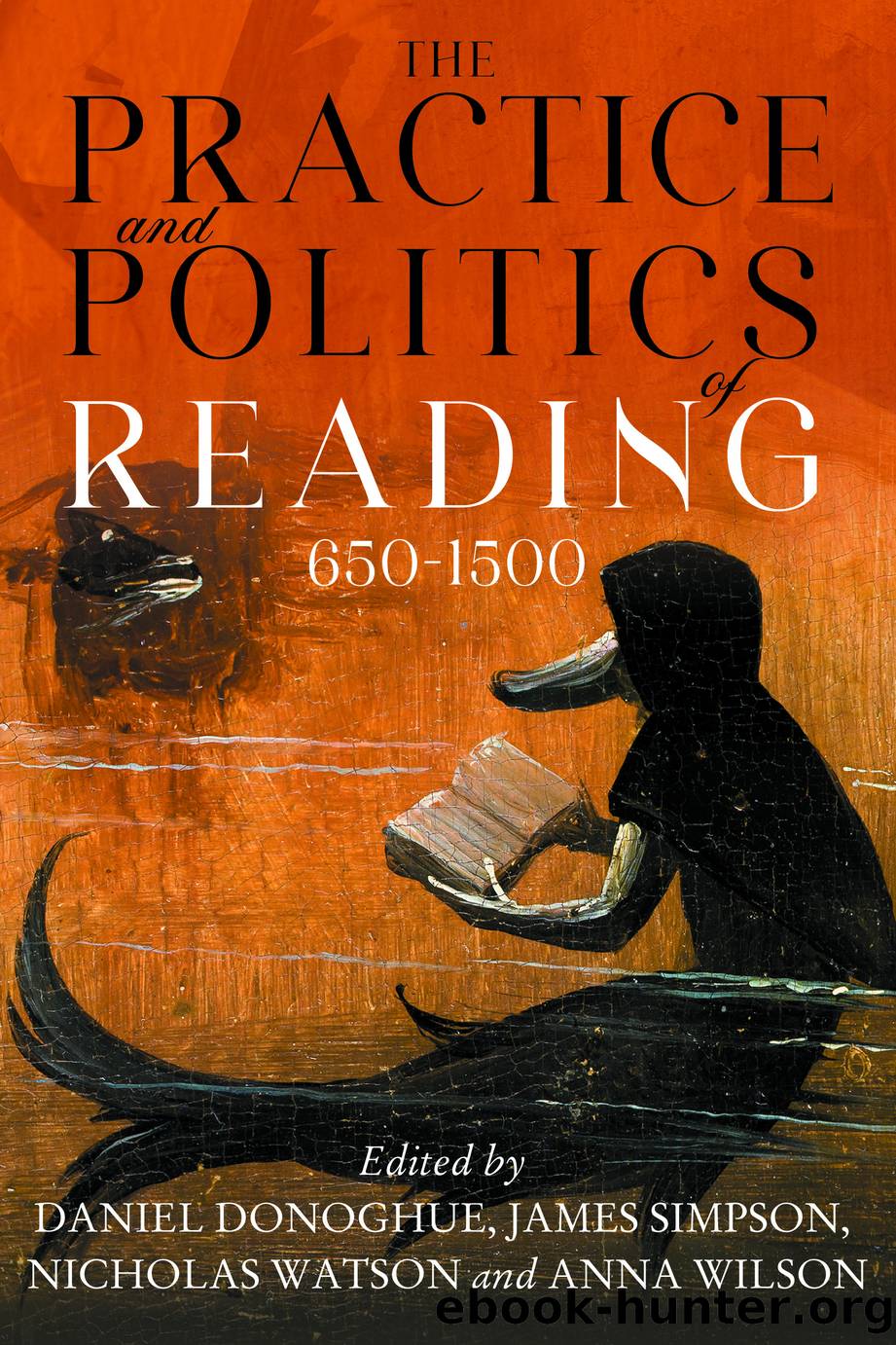The Practice and Politics of Reading, 650-1500 by Daniel G. Donoghue;James Simpson;Nicholas Watson;Anna Wilson;

Author:Daniel G. Donoghue;James Simpson;Nicholas Watson;Anna Wilson;
Language: eng
Format: epub
Publisher: Boydell & Brewer
Published: 2022-09-06T00:00:00+00:00
The Ideology of Reading in the Ãlfrician Moment
The prefatory letters accompanying Ãlfricâs extensive writings lay out the elements of an ideology of reading driven in critical ways by the perceived capabilities of different audiences â monastic and lay â and by the language of communication. Different audiences occasioned different concerns and at times pressed him to novel solutions to ensure orthodox interpretation. We see these dynamics vividly at play early in Ãlfricâs career in his famous Grammar, whose double prefaces, one in Latin and one in English, lay out separate strands of the ideology at work in the processes of reading within the tenth-century English Benedictine community. Together and separately, the Latin and Old English prefatory letters to Ãlfricâs Grammar engage in quarrels about literacy and interpretation that underlie his concerns over vernacular reading.22
Ego Ãlfricus, ut minus sapiens, has excerptiones de Prisciano minore uel maiore uobis puerulis tenellis ad uestram linguam transferre studui, quatinus perlectis octo partibus Donati in isto libello potestis utramque linguam, uidelicet Latinam et Anglicam, uestrae teneritudini inserere interim, usque quo ad perfectiora perueniatis studia. Noui namque multos me reprehensuros, quod talibus studiis meum ingenium occupare uoluissem, scilicet grammaticam artem ad Anglicam linguam uertendo. Sed ego deputo hanc lectionem inscientibus puerulis, non senibus, aptandam fore.23
[I Ãlfric, by no means learned, have engaged myself in translating for you young boys into your own language these excerpts from the lesser and greater Priscian, to the extent that after you have learned eight parts of Donatus, by reading thoroughly [perlegere] in this little book, you will be able to graft onto your youth each language, that is Latin and English, until you attain to more perfect studies. I recognize that many will criticize me, because I have wished to occupy my talent with such studies, that is, in translating the Ars grammatica into the English language; but I think that this instruction24 ought to be furnished to ignorant boys rather than senior monks.]
Ãlfricâs Latin preface to the Grammar practically vibrates with peculiarities and contradictions. It is addressed in elegant Latin to children who would have had a hard time reading it. Its self-deprecating authorial âminus sapiensâ is less reflexive modesty topos, than sly captatio benevolentiae anticipating a skeptical, if not openly hostile, target audience of senior monks. The various dissonances of this preface â the switch from âIâ to âweâ and back; its mismatch of content and putative addressees; its choice of an advanced grammar text paired with an avowedly simple translation (âsimplicem interpretationemâ); its novel topic of teaching Latin in English; its defensiveness; its concession to âthink what you likeâ and simultaneous snob appeal to Ãthelwoldâs teaching at Winchester â all offered to support the translation that followed â ask us to read the Latin prefatory letter (symptomatically, of course) as an introduction to ongoing arguments about the practices of reading at the turn of the millennium. It is clear, despite the workâs tender addressees, that Ãlfric expected this book to be used by teachers in their pedagogy, not children borrowing the book from some imagined library chest.
Download
This site does not store any files on its server. We only index and link to content provided by other sites. Please contact the content providers to delete copyright contents if any and email us, we'll remove relevant links or contents immediately.
The Power of Myth by Joseph Campbell & Bill Moyers(1057)
Half Moon Bay by Jonathan Kellerman & Jesse Kellerman(979)
Inseparable by Emma Donoghue(976)
A Social History of the Media by Peter Burke & Peter Burke(976)
The Nets of Modernism: Henry James, Virginia Woolf, James Joyce, and Sigmund Freud by Maud Ellmann(900)
The Spike by Mark Humphries;(809)
The Complete Correspondence 1928-1940 by Theodor W. Adorno & Walter Benjamin(783)
A Theory of Narrative Drawing by Simon Grennan(775)
Culture by Terry Eagleton(771)
Ideology by Eagleton Terry;(733)
World Philology by(712)
Farnsworth's Classical English Rhetoric by Ward Farnsworth(711)
Bodies from the Library 3 by Tony Medawar(708)
Game of Thrones and Philosophy by William Irwin(707)
High Albania by M. Edith Durham(699)
Adam Smith by Jonathan Conlin(687)
A Reader’s Companion to J. D. Salinger’s The Catcher in the Rye by Peter Beidler(686)
Comic Genius: Portraits of Funny People by(649)
Monkey King by Wu Cheng'en(647)
